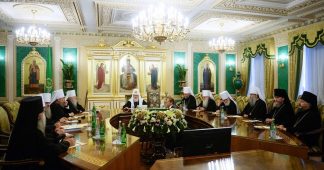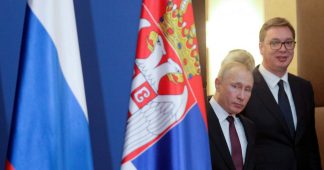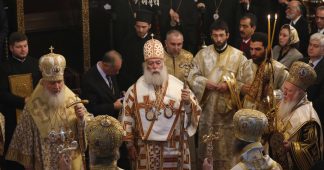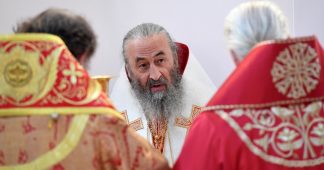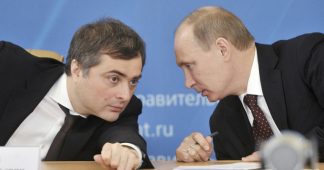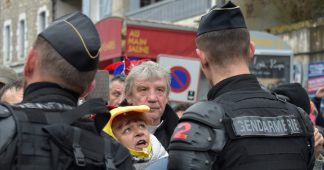25 Apr, 2020
President Vladimir Putin and Soviet leader Joseph Stalin will both make a surprise, if minor, appearance inside the main cathedral of the Russian Armed Forces, which is being decorated with historical scenes of the nation’s glory.
Photos showing an incomplete mosaic with the likenesses of Putin, other key government figures, and seemingly random people celebrating with national flags made quite a stir in Russia after being leaked to the media on Friday. The artwork is reportedly part of the grandiose church under construction in Patriot Park near Moscow, which is to become the main place of worship for the Russian military.
В главном храме Минобороны, который планируют открыть 9 мая, будут мозаики с изображениями Путина, Шойгу и Сталина, а также с фразой «Крым наш», пишет «МБХ медиа»https://t.co/1T1XTLpO1B pic.twitter.com/BDRjyG8Ewy
— TJ (@tjournal) April 24, 2020
Perhaps even more controversially, an image of Stalin – pictured on a banner held by Soviet soldiers on Red Square – appeared on another mosaic, supposedly intended for the chapel.
When asked about the images by reporters, the Kremlin was seemingly caught off guard, and spokesman Dmitry Peskov said “I unfortunately don’t know what is on the walls of the cathedral.”
Пишут, что это мозаика того самого главного храма Вооружённых сил в парке «Патриот». pic.twitter.com/Z93HsNzQ01
— Д л Ю ч (@zapyatoy) April 24, 2020
It didn’t take long for the Russian Orthodox Church to confirm the artwork was real – adding that the Kremlin had not been informed. Archpriest Leonid Kalinin, who chairs the church’s expert council on art and architecture, told TASS News Agency that “it reflects historical events, and was done without consulting with these persons, entirely on the basis of historical documents as decided by the art council.”
The church official confirmed that the first mosaic – titled ‘Bloodless joining of Crimea’ – shows people celebrating the March 2014 event and people who were key to it, while the ‘Victory Parade’ replicates a photograph of the May 1945 event that includes Stalin, the supreme commander of the Soviet Army in World War II. The reason both will appear in the cathedral is simple – historical accuracy, Kalinin said.
The art council considers these depictions absolutely appropriate and corresponding to historical truth, from which one should not arbitrarily tear out pages.
While the idea of depicting figures from modern history on the walls of a Christian cathedral did raise a few eyebrows, it is also fair to say that this will be no ordinary church. It is in fact partly a museum, themed to mark the 75th anniversary of victory over Nazi Germany in 1945 in minute detail. The cathedral will be surrounded by a memorial complex called Road of Memory, with tens of millions of photographs of WWII veterans built into it. Its interior, on the other hand, is said to feature all the milestone victories of the long and hard-fought Russian history.
Специалисты Военно-строительного комплекса завершают работы по внутренней и внешней отделке Главного храма ВС РФ.#Минобороны #ГлавныйХрам #Победа75
#ДорогаПамятиhttps://t.co/jKZ0L3ID14 pic.twitter.com/M5XUvSyATa
— Минобороны России (@mod_russia) April 24, 2020
Still, Church officials had to come up with an explanation for the artistic choices they made. Bishop Stefan of Klin, vicar of the Moscow Patriarchate and the abbot of the Armed Forces temple, told Moscow Daily RBK that showing historical events and personalities in church art is a centuries-old tradition in the Orthodox Church.
But the quest to depict all of Russia’s military history was not without controversy, Stefan revealed. Stalin, who led a Communist regime that had once viciously persecuted the church, was not a welcome figure, but the clergy eventually agreed he had to make an appearance based on his key WWII role.
“As for Stalin, he was depicted based on a historical photograph,” he told RBK. “This temple is being built in honor of Victory, so it would be wrong not to show the Victory Parade.”
Traditional Orthodox Christian themes will also feature prominently, and the mosaic depicting Putin is actually a small part of a greater picture honoring Our Lady of Kazan – one of the most revered icons of the Holy Mother in the Russian Orthodox Church – the artist behind the mosaic, Vasily Nesterenko, revealed to local outlet Daily Storm.
It remains unclear what Putin himself thinks of the artwork and its placement.
The church, officially called the Cathedral of the Resurrection of Christ, will be consecrated on May 9, though the rest of the Victory Day celebrations have been postponed due to coronavirus quarantine measures.
